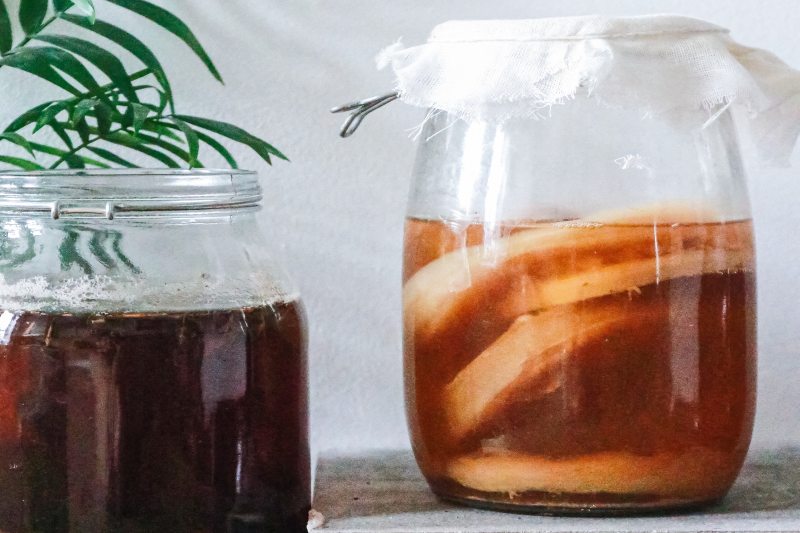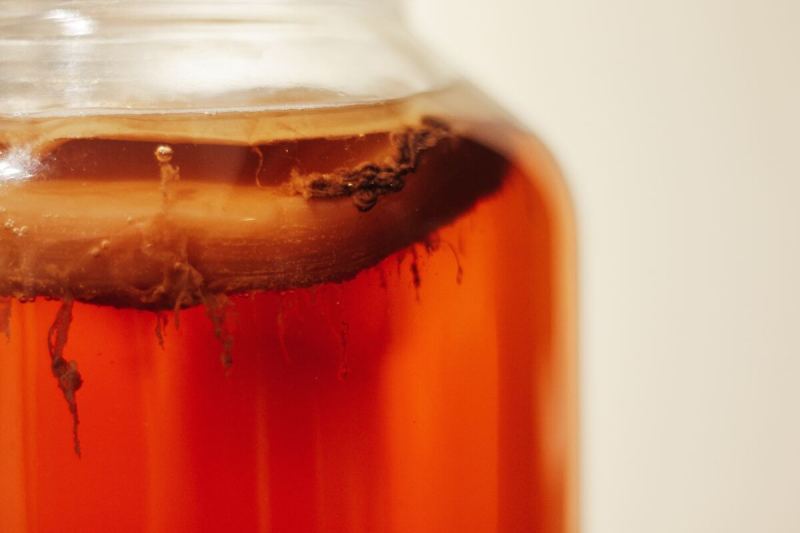
If you follow current health trends, you have likely heard of the most popular kombucha brands. Many people rave about the numerous kombucha benefits, whether the beverage is made at home or store-bought.
But what exactly is kombucha—is it tea? Soda? An alcoholic beverage? What are the benefits of kombucha? Does it live up to the hype? Should you start swapping your afternoon decaf for a bottle of kombucha, or better yet, start making your own kombucha at home?
What is kombucha?
Kombucha is a fermented tea beverage, typically made with black or green tea, sugar, bacteria, and yeast. Many kombuchas are flavored by adding spices like ginger or fruits such as fresh peaches and strawberries into the vat of tea while it ferments. Much like a sourdough bread starter, kombucha uses a starter culture (called a scoby) for each batch.
Kombucha is usually fermented for about a week, during which the gases, trace levels of alcohol, bacteria, and acetic acid are produced. Because acetic acid is also found in vinegar, kombucha has a notable bite to the flavor profile. Due to the fermentation process, gas is created in the tea, so kombucha is slightly effervescent but is not as carbonated as soda.
Kombucha is also not exactly an alcoholic beverage (unless you specifically buy hard kombucha), though it does contain some alcohol. The typical kombucha is about 0.5 percent alcohol by volume, which is significantly less than beer, which has approximately 5 percent alcohol by volume.
Benefits of kombucha

If you’ve never had kombucha, the description of it alone may be enough to deter you, as it can be a bit of an acquired taste. That said, there are quite a few reported benefits of kombucha, so it may be worth puckering up the first time and giving it a try.
1. Kombucha contains probiotics
The fermentation process produces beneficial bacteria, such as Lactobacillus species, known as probiotics. These same probiotics are found in other fermented foods, such as yogurt, kefir, sauerkraut, kimchi, and miso. Probiotics help populate your gut with the helpful bacteria that aid digestion, support your immune system, reduce inflammation, and produce essential vitamins, such as vitamins B and K.
2. Kombucha can aid digestion
Because kombucha provides probiotics, it can aid digestion, improve bowel regularity, and reduce nausea, bloating, and indigestion.
3. Kombucha contains antioxidants
At its core, kombucha is green or black tea. Green tea is packed with antioxidants and polyphenols, all of which are known to provide numerous health benefits, including increasing metabolic rate, reducing blood pressure, lowering cholesterol, improving cognitive function, and decreasing the risk of chronic diseases such as cardiovascular disease, type 2 diabetes, and certain cancers.
4. Kombucha has anti-bacterial properties
The fermentation process that kombucha undergoes produces acetic acid, which can kill harmful pathogens, such as invasive bacteria and yeasts, in the gut and prevent infection. Furthermore, this anti-bacterial effect seems to selectively kill unfavorable pathogens while preserving beneficial bacteria.
5. Kombucha may aid in weight loss
Green tea contains compounds such as epigallocatechin-3-gallate (EGCG), a catechin found to boost metabolic rate and increase fat burning, particularly in the abdominal area. Therefore, choosing a kombucha made with green tea may help support weight loss goals when coupled with a healthy calorie-controlled diet and physical activity.
6. Kombucha can improve blood sugar control
There is some evidence to demonstrate that regularly consuming low-sugar kombucha can lower blood sugar and improve insulin sensitivity. Green tea helps regulate blood sugar levels, so as long as you’re not guzzling a kombucha packed with added sugars, you may reap some of these blood sugar benefits.
How to make kombucha

Want to try fermenting your own kombucha? We’ve created an easy recipe flavored with ginger and pear. You can also swap in other fruits, such as peaches, cranberries, apples, or blueberries.
Homemade pear and ginger kombucha
Ingredients:
- 3 quarts water
- .5 cup of white sugar
- 1.5 cups fresh pears, sliced
- 1-inch piece of fresh ginger, peeled and diced
- 8 bags of green tea
- 2 cups of unflavored kombucha (store-bought or homemade from your last batch) as a starter to add the acidity necessary to keep harmful bacteria away.
- 1 scoby per fermentation jar (You can buy one at Cultures for Health or Yemoos)
Method:
- Bring the water to a boil and then remove it from the heat.
- Add the tea and stir in the sugar until it is fully dissolved.
- Steep for several hours until the water has fully cooled.
- Remove the tea bags and pour in the pre-made kombucha, combining thoroughly.
- Transfer the mixture to a large jug and place the scoby on top.
- Cover the jug with a cheesecloth or paper towels secured by a rubber band.
- Ferment your kombucha out of direct sunlight in a room-temperature environment for six days.
- After six days have elapsed, add the pears and ginger.
- Ferment another day or so. The kombucha is “done” and ready to bottle at any point after seven days when it has the particular balance of sweetness and tartness you enjoy.
- When it is done, carefully remove the scoby and place it on a clean plate.
- Pour the kombucha into bottles, ensuring there’s at least one inch of available space between the top of the bottle and the tea.
- Seal the bottles with their caps.
- Refrigerate the kombucha until you want to drink it, at which point you can strain it if you prefer a smooth texture.
Is it good to drink kombucha every day?

Many people can enjoy kombucha on a daily basis and reap the benefits. However, you don’t want to drink too much kombucha every day because you may experience nausea, gas, bloating, and vomiting. Some people will deal with these symptoms either way if they simply don’t tolerate kombucha well.
In conclusion, while kombucha has gained popularity for its potential health benefits, it is essential to approach it as part of a balanced and varied diet. It can be an enjoyable alternative to sugary sodas or an afternoon pick-me-up, but it’s always wise to consult with a healthcare professional if you have any specific health concerns.



